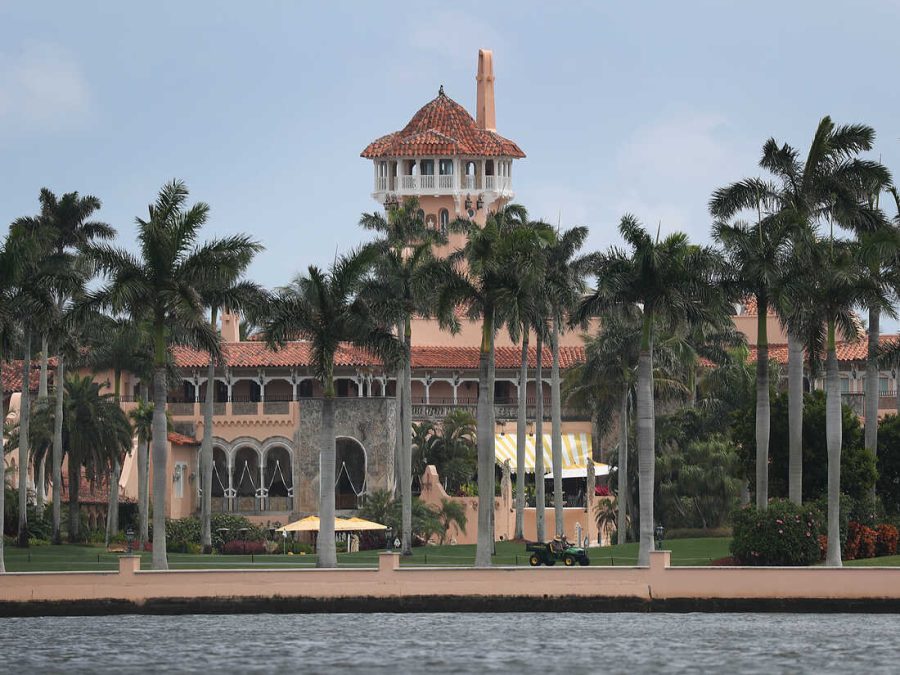The Secrets Revealed at Mar-a-Lago—And What They Mean for America
The classified documents found at Mar-A-Lago launched Trump into the legal spotlight, but what effect will this transgression have on American citizens?
October 18, 2022
Until the summer of 2022, the name “Mar-a-Lago” would most probably evoke the image of a sunny Palm Beach resort, despite its association with the past presidential administration’s controversies. However, in recent weeks, President Donald Trump’s “Southern White House” has taken center stage in a scandal that resulted in the discovery of more than three hundred classified documents.
This public affair began back in February, when the National Archives and Records Administration retrieved fifteen boxes of documents that Trump had stored at Mar-a-Lago, including communications with North Korean leader Kim Jong-Un and a letter from his predecessor, President Barack Obama. The release of these papers led the public to question whether or not Trump had acted in accordance with the Presidential Records Act of 1978, forcing the Department of Justice to formally open a criminal investigation in April of this year.
Then, on June 3, Jay Bratt—chief of the Justice Department’s Counterintelligence program—and two of Trump’s attorneys paid a visit to Mar-a-Lago and received documents gathered from a previously issued subpoena. In a recent filing, Trump’s lawyers claimed that Trump was very cordial during the meeting—but the DOJ told a judge that Trump’s council explicitly prohibited government personnel from opening or looking inside any of the boxes that remained in the storage room.
However, it wasn’t until August 5, 2022, when Judge Reinhart of the U.S. District Court of Southern Florida issued the FBI a search warrant, that the federal government could officially search Trump’s Florida property.
On August 8, 2022, almost thirty plainclothes federal agents launched a surprise attack on Mar-a-Lago and spent nearly nine hours searching the club’s storage room, Trump’s residential suite, and offices. According to Karine Jean-Pierre, a White House spokesperson, “No one at the White House was given a heads-up.”
The outcome of the search provided at least 325 documents containing classified markings from Trump, including several highly confidential files. One particular document retrieved during the August 8th search described a foreign government’s military defenses, including its nuclear capabilities. In addition to the classified documents, eleven thousand unclassified files were uncovered.
Unsurprisingly, the raid on August 8 resulted in substantial amounts of media coverage and elicited responses from citizens across the political spectrum.
Perhaps the part of the dispute that raised the largest amount of public and political backlash was the fact that the raid was completely unannounced and—according to some politicians—unprovoked.
While left-leaning politicians largely supported the FBI’s decisions, many right-wing politicians believe that the federal government used the over-politicization of American life to its advantage. In response to the raid, House Minority Leader Kevin McCarthy stated, “The Department of Justice has reached an intolerable state of weaponized politicization.”
In light of August 8, Trump has also issued many statements lambasting the siege on Mar-a-Lago, and “at a rally last weekend in Pennsylvania… Trump devoted meaningful time during his speech to attacking the FBI and Justice Department.”
Nevertheless, the reaction from American voters is quite expected—with polling indicating that most Republicans have Trump’s back in the investigation, while most Democrats think he broke the law. Even when considering independent voters, the majority believe that the FBI acted to the benefit of the American people, while only 41% disapproved of its actions.
So the question is raised: “Where do we go from here?”
As a result of the Mar-a-Lago case, federal District Judge Aileen Cannon issued a landmark ruling, granting Trump’s request to appoint a “special master” to independently review everything that the FBI carted away from Mar-a-Lago.
Following the judge’s decision, the Justice Department and Trump’s lawyers each proposed two selections to serve as the “special master.” Thomas Griffith (a retired federal judge and a George W. Bush appointee) and Barbara Jones (a retired federal judge and a Clinton appointee) were nominated on the behalf of the Department of Justice. As for Trump’s lawyer’s nominations, Paul Huck Jr. (partner at the Jones Day law firm) and Raymond Dearie (Reagan appointee and federal judge) were presented.
However, the judge also prevented the DOJ from using any of the procured documents in the ongoing criminal trial—which will undoubtedly slow down the review and investigation of the collected evidence.
In response, the Justice Department appealed the ruling, claiming the order was putting US national security at risk.
The appeal has not yet been considered—and as of today, America is stuck in what will most likely be months of back-and-forth communication before we get a solid verdict on both the documents retrieved from Mar-a-Lago and the criminal trial.
